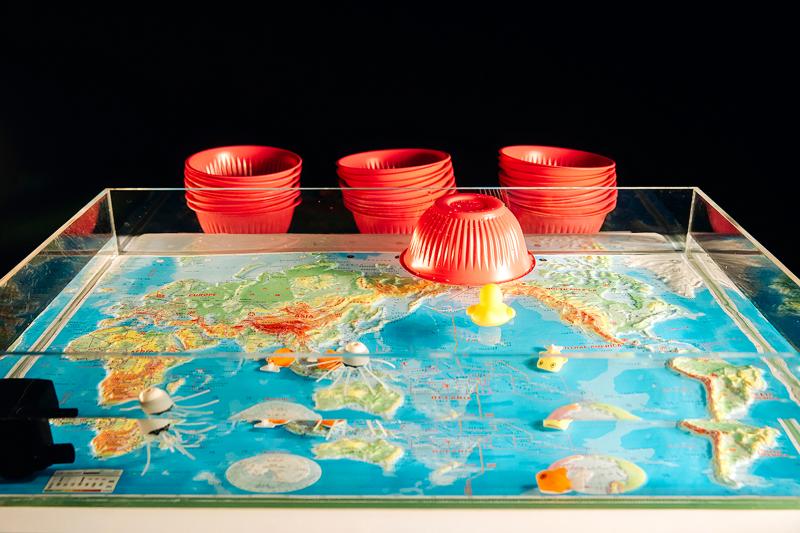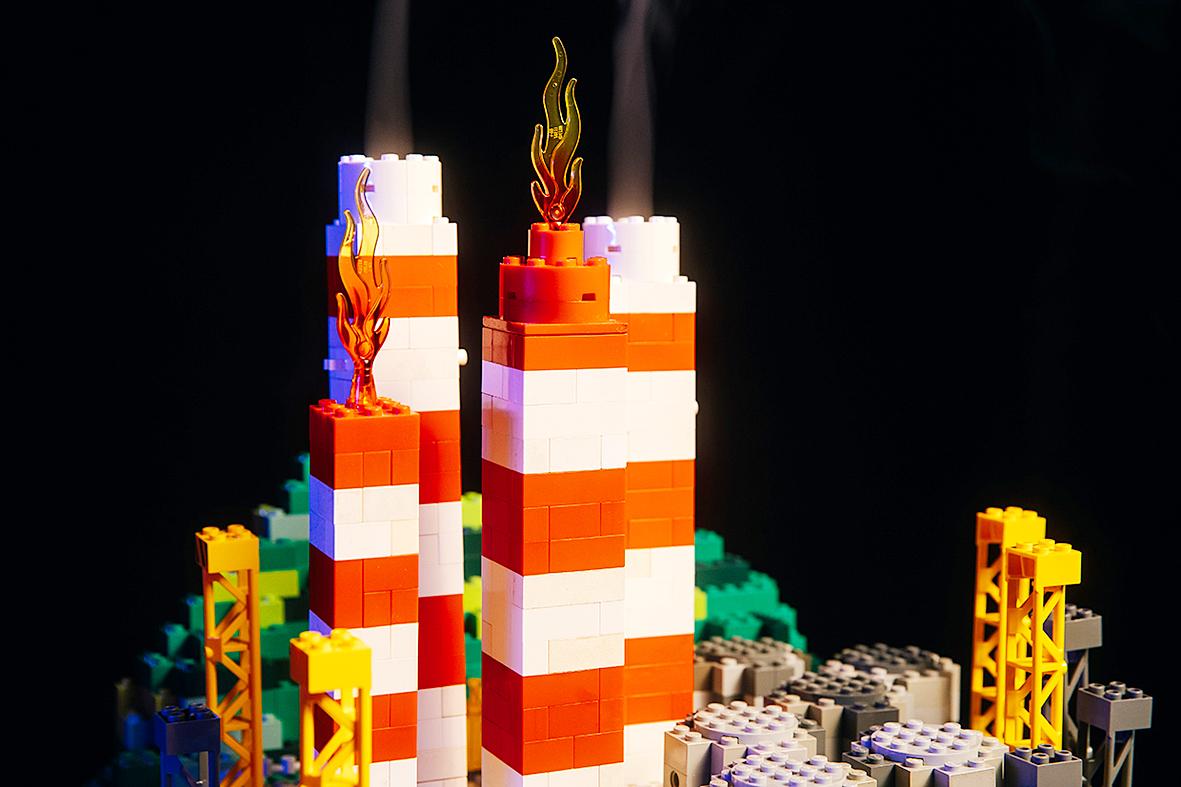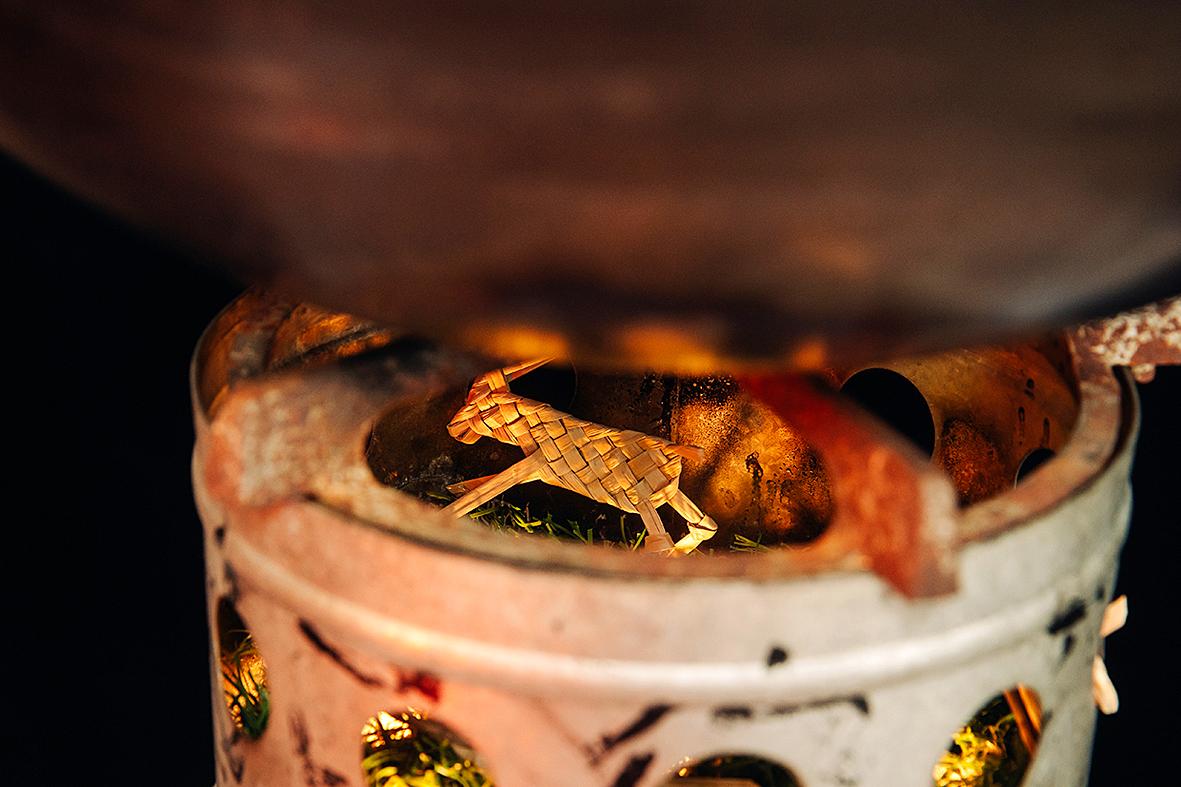In artist Tseng Yen-ting’s (曾彥婷) video Plastic Bowl, a cheery singer narrates a whimsical yet harrowing first-person life story of a plastic bowl: it takes 180 million years for a dead organism to fossilize and become natural gas or oil, 22 days to ship it to a factory, 96 hours to turn it into a disposable bowl, which is used for a mere 16 minutes at a temple banquet.
But that’s not the end.
The bowl breaks down into microplastics that remain in the ocean for thousands of years, and the tiny shards of plastic then watches as humanity leaves for outer space after presumably ruining Earth. The entire process is playfully animated using various found objects.

Photo courtesy of Tseng Yen-ting
“Everybody dies and I’m still on earth! Everybody leaves and I’m still on earth!” sings artist and songwriter Chiang Tao (蔣韜), who has been working with Tseng on petrochemical and plastic pollution-related projects in Taiwan since 2020 through Uncertain Studio (測不準工作室), which they co-founded.
The video shows one of four physical installations that make up Tseng’s latest project, The Collection of Time in the Polymer Age (在聚合世代採集時間), which explores the subjectivity of the scale of time through different topics related to Taiwan’s petrochemical industry.
Tseng became interested in this approach after reading Susan Freinkel’s Plastic: A Toxic Love Story and noticing how plastics have transformed humanity despite only being with us for a fraction of our existence.

Photo courtesy of Tseng Yen-ting
The Collection of Time in the Polymer Age is one of three projects featured by the newly-formed Magnify Art Collective, which invites creators from around the globe to highlight various social and environmental issues and contribute to the creation of new structures and solutions. The current focus is on plastic pollution, and as one of the world’s top petrochemical producers, Taiwan is an important country to focus on.
The project also promotes existing solutions such as zero-packaging stores and delivery giant Food Panda’s reusable container venture and looks at how government policy can be changed.
ART FOR CHANGE

Photo courtesy of Tseng Yen-ting
Specializing in object theater, Tseng says her earlier work was more poetic and focused less on social issues.
“Through performances, I became sensitive to different found objects and materials,” she says.
But after several residencies abroad, she began to explore the development of these materials in human history and how people generally choose to use them.

Photo courtesy of Tseng Yen-ting
“Can there be other choices? Can we choose different ways to live?” she wondered. “Our society no longer has to be one where we take natural resources — timber, camphor, deer hides — and create an industry from it. There are many decisions that lead to the creation of an industry, it’s not a given that it has to be this way.”
She read a lot on the plastic and petrochemical problem, but most of it was focused on the West, prompting her to do more research on the situation in Taiwan.
“I wanted to know how the plastic industry developed in Taiwan and how we became a major exporter of petrochemical products,” she says.
Uncertain Studio’s first project was the board game City of PVC Smokestacks (PVC煙囪之城), which takes players through important events and landmarks in the history of the industry.
Tseng was put in touch with Magnify, which is supported by the Cosmic Foundation, through the academics and activists she met promoting the game, and decided to create a completely new project that could reach more people.
PETROCHEMICAL STORIES
The concept of time was something that kept coming up for Tseng when doing research on the industry. She was astonished by the time it took for fossil fuels to be created versus the time it took to build up a massive single-use plastics industry.
When the Fifth Naphtha Cracker plant announced in 1990 that it would close in 25 years, it seemed like a short time by industry standards, but that’s enough time for an affected resident to see their child grow up and finish grad school.
“The weight of time is completely different, and we wanted to use this as a point of discussion,” Tseng says.
The other videos feature an anthropomorphized Kaohsiung Refinery built from Lego blocks that sighs wistfully, “Like a giant I always accidentally crush those around [me];” an old lady living near a factory who laments the loss of the muntjac deer; and Foreman Lin, whose wax figure melts as his son sings about his hard life that ends in tragedy.
Looking ahead, the Magnify collective will keep adding related projects to it’s roster, while Tseng plans on doing performances at the heavily polluted Dalinpu Community (大林蒲) in Kaohsiung, whose decades-long relocation struggle continues today.
The videos can be viewed at: magnify.art/asia/time.

Climate change, political headwinds and diverging market dynamics around the world have pushed coffee prices to fresh records, jacking up the cost of your everyday brew or a barista’s signature macchiato. While the current hot streak may calm down in the coming months, experts and industry insiders expect volatility will remain the watchword, giving little visibility for producers — two-thirds of whom farm parcels of less than one hectare. METEORIC RISE The price of arabica beans listed in New York surged by 90 percent last year, smashing on Dec. 10 a record dating from 1977 — US$3.48 per pound. Robusta prices have

The resignation of Taiwan People’s Party (TPP) co-founder Ko Wen-je (柯文哲) as party chair on Jan. 1 has led to an interesting battle between two leading party figures, Huang Kuo-chang (黃國昌) and Tsai Pi-ru (蔡壁如). For years the party has been a one-man show, but with Ko being held incommunicado while on trial for corruption, the new chair’s leadership could be make or break for the young party. Not only are the two very different in style, their backgrounds are very different. Tsai is a co-founder of the TPP and has been with Ko from the very beginning. Huang has

A few years ago, getting a visa to visit China was a “ball ache,” says Kate Murray. The Australian was going for a four-day trade show, but the visa required a formal invitation from the organizers and what felt like “a thousand forms.” “They wanted so many details about your life and personal life,” she tells the Guardian. “The paperwork was bonkers.” But were she to go back again now, Murray could just jump on the plane. Australians are among citizens of almost 40 countries for which China now waives visas for business, tourism or family visits for up to four weeks. It’s

A dozen excited 10-year-olds are bouncing in their chairs. The small classroom’s walls are lined with racks of wetsuits and water equipment, and decorated with posters of turtles. But the students’ eyes are trained on their teacher, Tseng Ching-ming, describing the currents and sea conditions at nearby Banana Bay, where they’ll soon be going. “Today you have one mission: to take off your equipment and float in the water,” he says. Some of the kids grin, nervously. They don’t know it, but the students from Kenting-Eluan elementary school on Taiwan’s southernmost point, are rare among their peers and predecessors. Despite most of